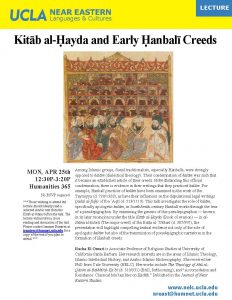
- This event has passed.
Kitāb al-Ḥayda and Early Ḥanbalī Creeds
Los Angeles, CA 90095 United States + Google Map

Among Islamic groups, Sunnī traditionalists, especially Ḥanbalīs, were strongly opposed to kalām (dialectical theology). Their condemnation of kalām was such that it became an established article of their creeds. Notwithstanding this official condemnation, there is evidence in their writings that they practiced kalām. For example, Ḥanbalī practices of kalām have been examined in the work of Ibn Taymiyya (d. 728/1328), as have their influences on the disputational legal writings (jadal al-fiqh) of Ibn ʿAqīl (d. 513/1119). This talk investigates the role of kalām, specifically apologetic kalām, in fourth/tenth-century Ḥanbalī works through the lens of a pseudepigraphon. By examining the genesis of this pseudepigraphon — known in its later recensions under the title Kitāb al-Ḥayda (Book of evasion) — in al-Ibāna al-kubrā (The major creed) of Ibn Baṭṭa al-ʿUkbarī (d. 387/997), the presentation will highlight compelling textual evidence not only of the role of apologetic kalām but also of the transmission of pseudepigraphic narratives in the formation of Ḥanbalī creeds.
Racha El Omari is Associate Professor of Religious Studies at University of California-Santa Barbara. Her research interests are in the areas of Islamic Theology, Islamic Intellectual History, and Arabic-Islamic Historiography. She received her PhD from Yale University (NELC). Her works include The Theology of Abū al-Qāsim al-Balkhī/al-Kaʿbī (d. 319/931) (Brill, forthcoming), and “Accomodation and Resistance: Classical Muʿtazilites on Ḥadīth.” Published in the Journal of Near Eastern Studies.

